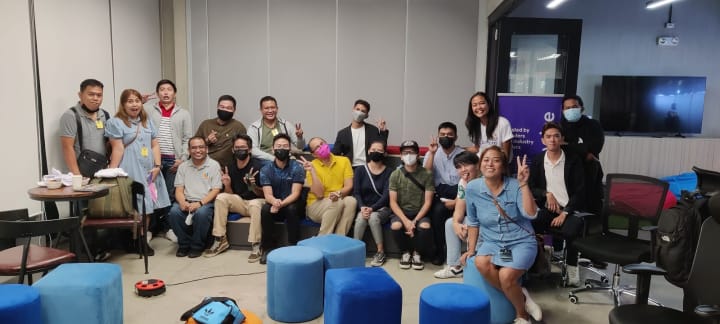Canonical talks cloud native and career development at community meetup in Manila
Canonical
on 5 August 2022
Tags: Cloud Native , Community , data , kubernetes
Canonical, the publisher of Ubuntu, joined ULAP.org in their cloud-native computing upskilling and career development initiative held in Dewise office in Manila, Philippines, last June. ULAP’s mission is to help underrepresented STEM students kickstart a career in cloud, data, and technology.
Michelle Anne Tabirao, Data Solutions Product Manager, participated as a speaker and shared insights on community and open-source data solutions. In addition, Alex Jones, Kubernetes Director, shared his career journey in tech and cloud-native computing. Other speakers in the event were Marilag Dimatulac and Renz Livelo shared their knowledge and experience about the community and Kubernetes technology.

What is cloud-native technology?
The Cloud Native Computing Foundation (CNCF) defines Cloud Native as
A technology that empowers organisations to build and run scalable applications in modern, dynamic environments such as public, private, and hybrid clouds. Containers, service meshes, microservices, immutable infrastructure, and declarative APIs exemplify this approach.
These techniques enable loosely coupled systems that are resilient, manageable, and observable. Combined with robust automation, they allow engineers to make high-impact changes frequently and predictably with minimal toil.
Cloud native is about speed and agility.
Business systems are evolving, from enabling business capabilities to tools for strategic transformation that accelerate velocity and growth. Cloud-native systems embrace rapid change, large scale, and resilience. This is because cloud native offers a better customer experience with Continuous Integration (CI) and Continuous Delivery (CD), increased reusability of software components, and improved business continuity with resilient cloud architecture. In addition, cloud-native computing promotes cultural collaboration and seamless processes.
Careers in tech and cloud-native computing
Grand View Research published a study which describes the global cloud computing market size was valued at USD 368.97 billion in 2021 and is expected to expand at a compound annual growth rate (CAGR) of 15.7% from 2022 to 2030. In line with this, cloud professionals are in high demand in this growing market.
A cloud practitioner needs to have multiple skills to be competitive in the cloud computing market. The CNCF Cloud Native Interactive Landscape provides valuable guidance. It documents a wide range of technologies used in app development, orchestration and management, runtime, provisioning, observability and analysis and platforms in the cloud-native space. It also features some famous cloud computing innovations like Prometheus, Kubernetes, Containerd, etc.
Alex Jones, Canonical Kubernetes Director, shared his career journey in tech at the ULAP.org event and his experience in cloud-native computing projects and communities. He is involved in Canonical open source Kubernetes projects and some CNCF open-source projects as a Technical Lead. At the event, he shared his experience in design, people, testing and implementation. Alex worked as a software engineer, tech lead, architect, and principal engineer prior to becoming the engineering director of Kubernetes at Canonical.
Alex also inspired the audience by sharing a glimpse (see photo below) of how he spends his professional time at work because he is involved in multiple cloud- native computing initiatives.

He also shared some career advice for ULAP.org tech practitioners and community members: always follow your curiosity and continuously learn. In addition, he encourages everyone to learn in public and be engaged with the open-source community.

Image: ULAP.org community meetup
Databases on Kubernetes on the rise
Michelle from Canonical also shared perspectives on data solutions, highlighting cloud-native computing, open-source database applications, and Canonical open-source database operators – Charmhub.io and the Juju Charmed Operator Framework. These were the key highlights from the talk:
- There is an increasing trend towards containerised applications, e.g. Kubernetes, in production.
- Cloud-native technologies empower organisations to build and run scalable applications in public, private and hybrid environments.
- Running a cloud-native database application in Kubernetes is becoming a trend, given organisations’ database requirements.
- Organisations should consider the operational workload when running a database in Kubernetes.
- Operators control database and Kubernetes primitives to simplify deployment and automate application operations.
Join these cloud-native communities
We really enjoyed sharing our experiences in the cloud-native space with ULAP and are excited to see new talent interested in shaping the future of open source and cloud native.
Are you interested in learning about emerging technologies in the cloud computing space? Canonical provides multiple spaces for practitioners to get involved in developing open source and community-driven cloud-native projects. Here are some of them:
- Open source operators in Charmhub. You can join some community discussions in Mattermost and Discourse.
- Canonical Kubernetes enterprise and community projects
- Ubuntu community

What is Kubernetes?
Kubernetes, or K8s for short, is an open source platform pioneered by Google, which started as a simple container orchestration tool but has grown into a platform for deploying, monitoring and managing apps and services across clouds.
Give your platform the deep integration it needs
Canonical Kubernetes optimises your systems for any cloud, on a per-cloud basis. Maximise performance and deliver security and updates across your whole cloud. Per-cloud optimisations for performance, boot speed, and drivers on all major public clouds Out-of-the-box cloud integration with the option of enterprise-grade commercial support.
Newsletter signup
Related posts
KubeCon Europe 2025: Containers & Connections with Ubuntu
It’s hard to believe that the first KubeCon took place nearly 10 years ago. Back then, Kubernetes was still in its early days, and the world was only just...
The hitchhiker’s guide to infrastructure modernization
One of my favourite authors, Douglas Adams, once said that “we are stuck with technology when what we really want is just stuff that works.” Whilst Adams is...
The future of Kubernetes networking: Cilium and other CNIs with Canonical Kubernetes
Choosing the right Container Network Interface (CNI) for Kubernetes is critical to achieving optimal performance, security, and scalability. With the launch...
